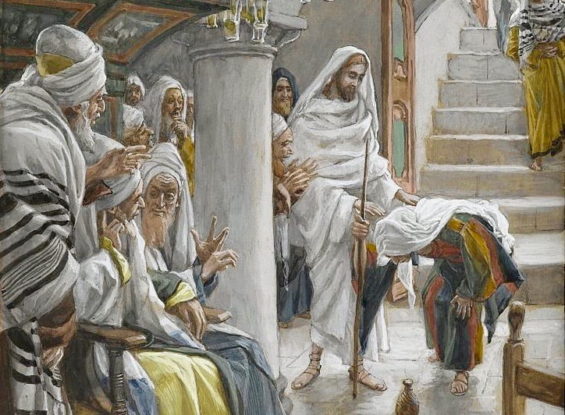Statistics show that in this country most of us at one time or another will become “invalid”. We may not stay that way, we may recover our health, but the fact is that for almost everybody at some point injury, illness, or the golden days of our old age may place us in a position where we can’t do what we once did. I remember how angry my grandpa became when he was told he couldn’t go out and cut wood anymore. He was a tall man and because of arthritis he was stiff as a board and had to be propped up with crutches or wind would blow him over. He was set up by the side of the barn and he and I would cut wood with the old buck saw. After about an hour of sawing I would be exhausted but he was still ready to go. When he was not allowed to do that anymore I think I actually saw tears in his eyes because it was another example of how he had become “invalid”.
There’s a theological picture here that is fascinating. When we are injured or sick or ill we turn in on ourselves. Because of pain or isolation or whatever we tend to focus on the pain and the isolation or whatever. That is the condition of humankind since the Fall. Luther called it “Curvatus in se”. The sinful soul turned it on itself is unable to turn towards God or the neighbor and therefore as far as it’s created purpose is concerned, it is invalid. It’s cramped up and unable to open up to those broad spaces that scripturally define salvation. It is a sickness.
This from Luke 13 –
10 On a Sabbath Jesus was teaching in one of the synagogues, 11 and a woman was there who had been crippled by a spirit for eighteen years. She was bent over and could not straighten up at all. 12 When Jesus saw her, he called her forward and said to her, “Woman, you are set free from your infirmity.” 13 Then he put his hands on her, and immediately she straightened up and praised God.
14 Indignant because Jesus had healed on the Sabbath, the synagogue leader said to the people, “There are six days for work. So come and be healed on those days, not on the Sabbath.”
15 The Lord answered him, “You hypocrites! Doesn’t each of you on the Sabbath untie your ox or donkey from the stall and lead it out to give it water? 16 Then should not this woman, a daughter of Abraham, whom Satan has kept bound for eighteen long years, be set free on the Sabbath day from what bound her?”
17 When he said this, all his opponents were humiliated, but the people were delighted with all the wonderful things he was doing.
David Lyle Jeffre comments –
St. Augustine noted, both her condition and her healing function like a “visible word,” for in her painful, earthward orientation she is a physical sign for the spiritual condition of all humanity outside of Christ, juxtaposing sinful reality and the higher good to which we are called. In his homily on this passage, Augustine asks his hearers to see themselves in this woman, for “the whole human race was bent double . . . weighed down by earthly lusts.” Her healing is thus a miracle that speaks powerfully of God’s grace by which his image in us is restored and we are made ready for the “kingdom of heaven”:


